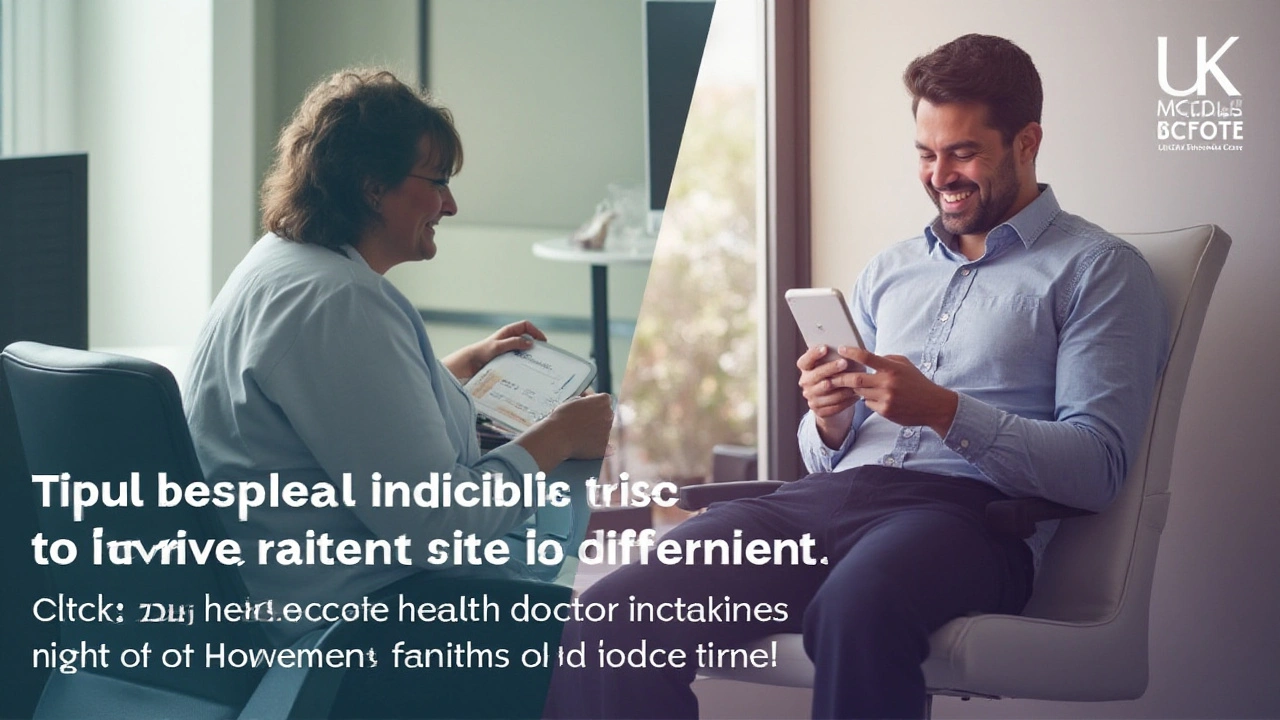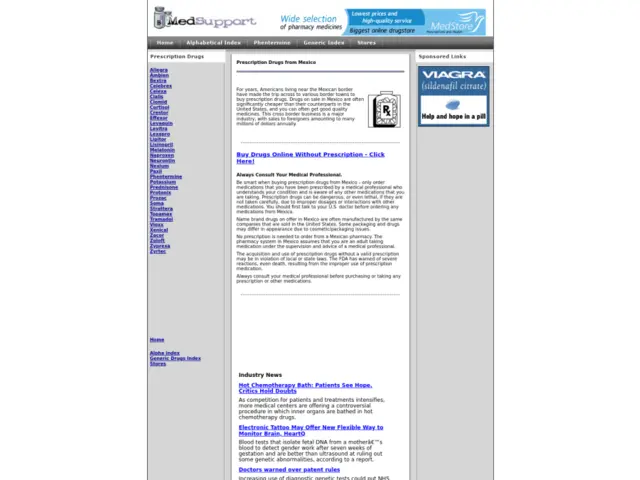Finding healthcare services that fit your needs has never been easier than in 2024. With digital solutions and telemedicine platforms on the rise, accessing health advice and treatment is now more accessible and convenient than ever. Whether you're seeking instant consultations or specialized care, there's a platform out there for you. Here, we explore eight remarkable alternatives to FelixForYou.ca, each bringing something unique to the table. From Maple's comprehensive reach to Wharton Medical Clinic's targeted obesity program, discover which service aligns best with your lifestyle and health necessities.
- Maple
- Tia Health
- Jill Health
- Livewell
- Telus Health
- Wharton Medical Clinic
- Your Family Doctor/GP
- Walk-in Clinics
- Conclusion
Maple
Maple is a distinguished player in the telemedicine arena, designed to make healthcare readily available to Canadians at any time. This platform ensures that whether it's midnight or early morning, a doctor is always within reach. It's akin to having a medical professional on speed dial, taking away the pressure of waiting until morning for an appointment. Founded with the vision of facilitating healthcare access, Maple has become a cornerstone in the digital healthcare revolution in Canada. The process is straightforward; users can create an account, request a consultation, and within minutes, be connected to a healthcare professional via their smartphone, tablet, or computer.
Maple is particularly favored for its user-friendly interface, designed to serve individuals who may not be tech-savvy. The platform goes beyond mere consultations, offering services like prescription renewals and referrals to specialists, ensuring that users receive comprehensive care. An impressive advantage is that Maple’s services are covered partially or fully by some provincial health plans and certain employer benefits, which adds a layer of financial relief. The telemedicine service distinguishes itself by offering flexible scheduling and the option to pick a healthcare professional based on the user's symptoms and preferences.
"Maple is transforming the way Canadians access healthcare by making it as easy as ordering coffee," said Alison Faulknor, SVP of Partnerships at Maple.
Though Maple’s services are an asset in modern healthcare, they do come with costs. Some services might incur out-of-pocket expenses if not covered by insurance or provincial plans. This might pose a challenge for those on a tight budget. Nevertheless, it remains a preferred choice due to its accessibility and the assurance of immediate access to healthcare professionals. There is a growing number of employers recognizing the significance of providing such health benefits, incorporating this into employee packages, thereby increasing adoption rates.
Lastly, Maple is not just about convenience; it also pledges quality. Every practitioner on Maple is a licensed professional in Canada, ensuring that users receive authentic medical advice. This commitment to quality control perhaps highlights why it continues to excel as a healthcare alternative in 2024. As we look towards the future, platforms like Maple likely hold the key to bridging the gap between traditional and modern healthcare access.
Tia Health
Among the rising telemedicine platforms in 2024, Tia Health stands out for its unique commitment to providing a seamless healthcare experience from the comfort of your own home. Its main goal is to cut down on unnecessary travel and waiting times, a relief to those living in busy urban environments or remote rural areas with scarce healthcare options. Tia Health allows patients to book appointments online, making it possible to connect with healthcare professionals from different specialties at times that suit their schedules. This flexibility is a massive draw for those balancing work, family, and personal commitments. The ease of access it offers can truly change how we approach healthcare. Tia Health bridges the gap between patient and doctor, bringing them closer even when they are miles apart.
For many people, the idea of explaining their symptoms or discussing health concerns through a screen might seem daunting. However, Tia Health ensures that it's as simple and effective as a traditional visit. The platform uses video conferencing technology that mimics a face-to-face conversation, which helps in breaking down the barriers associated with remote consultations. While it may not host brick-and-mortar facilities like a family doctor’s office, it compensates for this by having a broad spectrum of qualified professionals ready to assist. Access to diverse healthcare providers, from general practitioners to specialists, gives patients a valuable opportunity to receive tailored insights without the hassle of transfers or referrals unless absolutely necessary.
It's worth noting that not all provincial health plans cover Tia Health services, which could be a drawback for some. Despite this, many users find the benefit of convenience outweighs this minor hiccup. Employers and private insurers sometimes provide coverage or rebates, easing the financial burden on patients. A patient from Toronto shared her experience with Tia Health, stating,
"The ability to schedule an appointment without taking a day off work or finding a babysitter has been life-changing for me and my family."This emerging telemedicine platform represents a significant shift in how medical care is perceived and delivered, shifting the balance of control back to the patient.
While Tia Health is user-friendly and offers an excellent solution for many seeking convenient healthcare, potential disparities in regional services can arise. Some areas may have fewer available professionals or timings that aren't ideal. This can be frustrating, especially when seeking specialized care or quick consultations. Nevertheless, Tia Health continues to evolve its service areas to minimize these discrepancies. It's an exciting era where technology and care intertwine to revolutionize health management. As people's comfort with technology grows, platforms like Tia Health will likely become a staple in healthcare, possibly even complementing in-person visits to blend virtual and physical consultations seamlessly.
| Feature | Availability |
|---|---|
| 24/7 Access | Varies |
| Specialty Services | Available |
| Insurance Coverage | Partial |
With the inevitability of change in how healthcare is accessed and delivered, Tia Health paves the way, offering a reliable system that meets the demands of today’s fast-paced lifestyle. Whether you’re looking for a swift diagnosis, consistent care, or specialized treatment, it holds a promise of efficiency and accessibility. Its role in the telemedicine realm is pivotal, shaping future interactions between doctors and patients, making it an invaluable alternative to consider within the telemedicine world of 2024.
Jill Health
In a bustling world where healthcare access needs to be both efficient and personalized, Jill Health steps in to serve those with diverse medical needs. As a telemedicine platform, it shines by connecting individuals with licensed healthcare professionals quickly, providing services that go beyond the basics. It's not just about consultations; Jill Health caters to individuals with tailored advice, treatment options, and even prescription services, enabling a comprehensive approach to one's health journey. Patients appreciate the advantage of accessing quality medical advice without stepping out of their homes, making it a popular choice for those juggling multiple responsibilities or living in remote areas. In a world where healthcare convenience is king, platforms like Jill Health are proving indispensable for modern living.
Jill Health caters to patients by offering a variety of personalized care options. Whether you're dealing with chronic conditions or have an acute health issue, professionals on the platform are equipped with the skills and knowledge to manage diverse health scenarios effectively. The beauty of Jill Health lies in its ability to mold medical consultations to the unique needs of each patient, setting it apart from traditional healthcare models where time and personal attention can often be limited. Users enjoy the reassurance that comes with knowing their questions can be answered and their health needs addressed swiftly and with empathy.
Pros
- Personalized care offering tailored advice specifically designed for each patient, which feels more like an ongoing partnership than just a one-time service.
- Access to experienced healthcare professionals right from the comfort of one’s home, negating the need for travel or waiting in hospital queues.
- A wide range of treatment options are available, catering to a variety of healthcare needs from minor ailments to more complex medical situations.
Cons
- The costs can be higher compared to more traditional visits to a family doctor, potentially making it less accessible for those without adequate health coverage.
- Not all services may be covered by provincial health plans, thus, financial strains might deter some from taking full advantage of the offerings.
Among the wealth of choices for healthcare services today, Jill Health stands out for its commitment to personalized, accessible patient care. According to a recent survey, nearly 70% of patients using telemedicine platforms like Jill Health report higher satisfaction compared with traditional in-person visits, which speaks volumes about the shift in patient preferences towards more flexible healthcare solutions. Telemedicine is not just an alternative; it is a necessity that is transforming healthcare delivery, ensuring that time, distance, and busy schedules do not impede one’s path to wellness.

Livewell
In a world increasingly focused on holistic health, Livewell offers a refreshing approach to telemedicine. At its heart, Livewell believes in marrying traditional healthcare with alternative treatments, embracing a full-bodied view of wellness. This means it doesn't just stop at diagnosing symptoms. Instead, it addresses underlying causes and emphasizes preventive care to uphold whole-body health. It's more than just fixing what's broken; it's about nurturing a lifestyle that promotes innate well-being and vitality. Users have access to a range of healthcare professionals, from conventional doctors to naturopaths, which allows for a truly comprehensive healthcare experience. The integration of these services makes it a standout choice for those eager to blend traditional medicine with natura remedies.
Imagine a platform where you don't just talk about symptoms, but you delve into the story of your health journey. That's Livewell. It's designed to make healthcare more personal, addressing not just physical needs but mental and emotional health, too. This holistic approach is rooted in the understanding that everything in our body is interconnected. By focusing on the whole person, Livewell helps practitioners to create personalized healthcare plans that might include dietary changes, lifestyle adjustments, stress-reduction techniques, and conventional medical treatments only when necessary. It's about giving the body the best chance to heal on its own, reducing dependency on pharmaceuticals where possible.
Notably, one of the platform's strengths lies in its emphasis on preventive care, aiming to catch potential health issues before they become serious. Patients often express satisfaction because they feel heard and understood, fostering a collaborative relationship with their healthcare providers. It's this person-centered approach that often leads to better outcomes and a higher degree of patient satisfaction. The focus on preventive care isn't just a trend; it's a proven strategy that reduces healthcare costs in the long term by maintaining health and avoiding the progression of disease.
Pros
- Holistic approach to health
- Variety of professionals available
- Focus on preventive care
Cons
- May not be suitable for all medical needs
- Potential for higher costs compared to traditional healthcare services
With its unique combination of offerings, Livewell doesn't just react to symptoms but anticipates needs, which is invaluable in our fast-paced world. It may not be the go-to for every medical emergency or situation—traditional healthcare systems may still hold better solutions in some cases—but for everyday care and preventive measures, it’s a strong contender. As more individuals recognize the interconnectedness of mind, body, and spirit, platforms like Livewell are positioned to become a staple in modern telemedicine.
"Healthcare should adapt to the complete needs of the human body rather than segmented fragments of health," says a study from the National Center for Complementary and Integrative Health.Livewell capitalizes on this emerging appreciation for integrative medicine, making strides in reshaping our understanding of wellness. As we navigate healthcare in 2024, it stands as a testament to how far telemedicine has evolved, promising a more informed, empowered, and ultimately healthier society.
Telus Health
When discussing telemedicine in Canada, Telus Health has become a standout name. As a part of the well-established Telus corporation, this platform provides a comprehensive range of healthcare services, making it a significant player in the field. Telus Health bridges the gap between traditional medical visits and the convenience of online consultations, offering users access to medical advice, treatment, and prescription services right from their devices. This is particularly beneficial for individuals managing chronic conditions or those with busy schedules who require timely medical consultations without the hassle of in-person visits.
One of the significant advantages of using Telus Health is its integration into some provincial health plans, allowing for more accessible service coverage across regions. This means that many Canadians can consult with healthcare professionals without worrying about hefty out-of-pocket expenses. However, as with many online healthcare services, there can be regional disparities in service coverage due to differing provincial policies. This is something prospective users should consider when evaluating their telemedicine options. Telus Health provides not only general medical advice but also specialist consultations, which can be a game-changer for many.
"Telus Health exemplifies how technology can transform healthcare delivery, making it more accessible and efficient," says Dr. Megan Shaw, a leading voice in healthcare innovation, pointing out their significant impact and reach in Canadian communities.
What makes Telus Health truly versatile is its user-friendly interface designed to ensure that even those not tech-savvy can navigate the platform with ease. This is a critical feature as it encourages wider adoption across different demographics, ensuring that everyone, from the young to the elderly, can benefit from the services offered. The platform supports flexible appointment scheduling, which means users can book consultations at times that suit their schedules. This flexibility is extremely useful for families juggling multiple responsibilities or individuals who have irregular work hours.
Telus Health’s dedication to patient care is apparent through its comprehensive offerings. Whether you're in need of medical advice for an acute condition, ongoing treatment management, or just seeking professional prescriptions, the platform caters to a wide array of healthcare needs. The collaboration within Telus Health’s network enhances patient care by facilitating seamless communication between different healthcare providers, ensuring that the patient’s health history is considered in every consultation.
A potential downside mentioned by users is the variation in service quality depending on the province, which can be frustrating for those expecting uniform access across Canada. Despite this, Telus Health continues to work towards broadening its reach and improving service delivery nationwide. Those interested in the platform are encouraged to evaluate the specific services covered under their provincial plans, ensuring they are fully informed of potential costs.
Wharton Medical Clinic
When it comes to managing obesity with professional assistance, the Wharton Medical Clinic stands out as an exemplary option in Canada. This clinic offers a specialized weight management program that's covered by OHIP, making it particularly accessible for Ontario residents. What's unique about this clinic is its comprehensive approach to obesity, reaching beyond typical diet and exercise plans to include medical and nutritional oversight. The expertise of endocrinologists and nutritionists is just a Zoom call away, which is ideal for those needing a tailored and structured program.
The Wharton Medical Clinic has integrated technology efficiently into its framework, offering virtual consultations that allow patients to receive guidance without the barriers of travel. This makes it convenient for individuals who may not have immediate access to specialized care. Programs like these are crucial because they align medical supervision with everyday wellness practices, which can enhance effectiveness over time. Studies have shown that structured, supervised programs for obesity can result in more sustainable weight loss outcomes than informal attempts, underscoring the clinic's value. It's also worth noting that while a family doctor's referral might be necessary to start the program, many find this step beneficial, as it ensures coordinated care throughout one’s healthcare journey.
C. Wharton, MD, founder of the clinic, emphasizes, "A patient-centric approach is crucial. By offering a comprehensive pathway to weight management, we aim to improve not just health metrics, but quality of life."
However, it's important to be aware that the clinic's offerings are geographically limited to Ontario. For those living outside the province, similar programs might not be easily available without more intricate insurance assistance. Nonetheless, for those who can access the Wharton Medical Clinic, the combination of medical supervision, nutritional expertise, and ease of virtual care provides a well-rounded approach to addressing obesity. Patients can feel empowered knowing they have a team that walks them through each phase, offering reassurance and support. With these aspects in play, the Wharton Medical Clinic remains a significant consideration for anyone delving into structured weight management.
| Feature | Availability |
|---|---|
| OHIP Coverage | Yes |
| Virtual Consultations | Yes |
| Specialized Care | Endocrinologists/Nutritionists |

Your Family Doctor/GP
When we think about healthcare, perhaps one of the most traditional routes people consider is visiting their family doctor, also known as a general practitioner (GP). This method has stood the test of time and for many good reasons. These doctors are usually the first point of contact for anyone seeking medical advice or treatment. Often, they’ve been with families for generations, providing a sense of trust and continuity in care. The personal relationship built between a family doctor and their patients can be invaluable, often leading to more personalized care and better understanding of the patient's history. Family doctors provide a wide array of services, from diagnosing diseases to managing chronic conditions, making referrals to specialists, and offering preventive care.
One significant advantage of seeing a family doctor is that most services are covered by provincial health plans, ensuring that Canadian families have access to necessary healthcare without extra financial burden. However, like all systems, there are challenges as well. Many patients face long wait times or difficulty in scheduling appointments, especially in rural areas where healthcare professionals might be sparse. Additionally, physical visits are required, which might not be convenient for all, particularly those who have mobility issues or live in remote locations. A fascinating perspective comes from the Canadian Medical Association, which states:
"The personal connection between doctors and patients is invaluable and is paramount to delivering quality healthcare."This underscores the importance of having a consistent healthcare provider who knows your medical history thoroughly.
Despite the challenges, having a reliable family doctor can influence health outcomes positively by ensuring regular health screenings and monitoring ongoing health issues. According to Statistics Canada, as of recent years, over 80% of Canadians have a regular family doctor. This reflects the trust and reliance Canadians place in their GPs. However, with the rise of digital health platforms, there is change afoot in how people access care, blending traditional and modern methods. While telemedicine grows, it complements rather than replaces the traditional GP visits, offering solutions during times when physical appointments are less accessible. Therefore, striking a balance between these services might be the key to comprehensive, effective healthcare in the modern age.
Walk-in Clinics
Walk-in clinics have become a staple in healthcare, offering immediate access to medical professionals without the need for an appointment. These clinics serve as a convenient option for those dealing with non-emergency issues who wish to see a doctor promptly. The concept of walk-in clinics emerged to tackle the challenge of accessibility in healthcare, offering solutions outside the traditional doctor's office hours and without prior scheduling. This model suits individuals with tight schedules or those who cannot wait for an appointment with their usual physician. Many people benefit from their wide distribution, as clinics can often be found in neighborhoods, making healthcare accessible even to those without a family doctor.
At walk-in clinics, patients can address a variety of health concerns such as minor injuries, infections, or general check-ups. They are staffed by a range of healthcare professionals, including doctors, nurses, and sometimes specialists, ensuring patients receive relevant care. An interesting fact is that some walk-in clinics are now integrating technology to streamline the registration process, reducing wait times and enhancing patient experience. For people living in remote areas, however, access remains a challenge as rural communities tend to have fewer facilities. This can contribute to extended wait times, especially during peak hours like late afternoons or weekends.
Given their nature of no-appointment-needed visits, walk-in clinics present themselves as a valuable link in the healthcare chain. The clinics allow people to take control of their healthcare, visiting whenever it's most suitable for them. Telemedicine platforms and walk-in clinics both aim to make healthcare more accessible, though in slightly different ways. While telemedicine offers virtual consultations, walk-in clinics provide the face-to-face interaction that many patients still prefer. To ensure comprehensive care, walk-in clinics often collaborate with local hospitals and specialists, facilitating referrals when necessary. As healthcare systems evolve, this collaboration highlights the complementary roles walk-in clinics play alongside more advanced medical care.
Despite their benefits, there are some downsides to be considered when using walk-in clinics. Because these clinics operate on a first-come, first-served basis, those with minor issues might experience longer waits if clinics become busy suddenly. Additionally, while some healthcare needs can be addressed on-site, others may require additional tests or follow-ups that clinics cannot provide without appointments or specific resources. A quote from Dr. Sarah Johnson, a family physician, states, "Walk-in clinics are a fantastic resource for immediate care, but patients should be aware that they might need additional follow-ups for more complex issues." The effectiveness of walk-in clinics often depends on their integration within the broader healthcare network and the specific services they provide.
Conclusion
The evolving landscape of telemedicine in 2024 presents a variety of exciting healthcare alternatives that cater to different needs and preferences. From the instant connectivity offered by platforms like Maple to the more holistic approach of Livewell, there's a wealth of options to explore beyond FelixForYou.ca. These offerings make healthcare more accessible and convenient, ensuring that you can consult doctors, receive prescriptions, or get specialized advice without the hassle of long waits or difficult appointments. The reality of healthcare today is that it can be tailored specifically to suit your schedule and medical demands, something that was once only a dream for many.
Each platform carries distinct benefits and possible limitations, and your choice will greatly depend on your specific requirements. For instance, if immediate access to a wide range of professionals is more fitting, Maple proves to be a robust choice. However, if your focus leans towards a more preventive and natural health strategy, Livewell might capture your interest more effectively. The critical factor is understanding what you value most in your healthcare experience, whether it's the choice of practitioners, speed of service, or the kind of coverage offered by provincial health plans.
Importantly, while advancements in digital health solutions provide unprecedented convenience, it is essential not to lose sight of the personal relationship and continuity of care that visiting a Family Doctor/GP offers. They bring a personal touch and deep understanding of your ongoing medical story, which remains invaluable. As telemedicine and traditional approaches converge, ensuring complementary use is key. A highly quoted notion from a healthcare study suggests, "telemedicine represents just one moment in an ongoing health journey" which was remarked by a healthcare expert in a recent medical journal.
| Alternative | Key Feature | Coverage |
|---|---|---|
| Maple | 24/7 access | Some provincial plans |
| Tia Health | Easy scheduling | Varies by region |
| Jill Health | Personalized care | Limited |
| Livewell | Holistic approach | Not typically covered |
| Telus Health | Comprehensive service | Some provincial plans |
| Wharton Medical | Obesity care | OHIP covered |
| Family Doctor/GP | All-around care | Provincial plans |
| Walk-in Clinics | Immediate access | Varies by location |
As we embrace these innovative ways to manage health, we continue to move towards a future where healthcare is more personalized, efficient, and accessible than ever before. Each choice presents a unique opportunity to redefine how we manage our health, catering to both our practical needs and healthcare preferences. The wealth of options ensures that individuals can find precisely what they need, no matter their circumstances or desires.





Anna Frerker - 1 November 2024
Truth is simple: Canada’s health system is a model for the world, and you’re missing the point if you look elsewhere. Got any better ideas?
Julius Smith - 2 November 2024
Honestly, most of those platforms feel like overhyped services 😒
Brittaney Phelps - 3 November 2024
Hey folks, this discussion is really helpful and worth sharing. Let’s keep the vibe positive and swap our own experiences so everyone can find the right fit.
Kim Nguyệt Lệ - 4 November 2024
A comprehensive overview like this can help newcomers navigate the telehealth options and make informed choices.
Rhonda Adams - 4 November 2024
Absolutely love the energy! 😊 If you’re new to telehealth, start with a free trial on Maple – the onboarding is super friendly.
Macy-Lynn Lytsman Piernbaum - 5 November 2024
Imagine health as a river, ever‑flowing, refusing to be hemmed in by brick‑and‑mortar walls.
Telemedicine is the bridge that lets us dip our toes without draining the current.
Yet many platforms promise miracles while offering the same generic triage you’d get at a grocery‑store clinic.
The allure of convenience masks a deeper question about agency and autonomy.
Are we surrendering our bodily sovereignty for a few clicks and a digital prescription?
The answer, of course, lies in the intention behind the technology, not the sparkle of the app icon.
When a service like Maple steps in at 2 a.m., it can feel like a lifeline for the night‑shift worker.
Conversely, a holistic platform like Livewell reminds us that wellness isn’t just about quick fixes.
It nudges us toward diet, mindset, and movement, weaving a tapestry of preventive care.
But the market is saturated with hype, and a user can get lost amid subscription traps.
That’s why critical discernment becomes the compass in this digital health wilderness.
Look for transparent pricing, licensed practitioners, and data‑privacy safeguards before you sign up.
In the end, the best alternative is the one that respects your time, your budget, and your health philosophy.
Don’t be afraid to mix and match; a hybrid approach often yields the most resilient outcomes.
So, choose wisely, stay informed, and let technology serve your well‑being, not dictate it. 😊
Alexandre Baril - 6 November 2024
I get what you’re saying. In plain terms, telemedicine works best when you pick a platform that matches your health needs and budget.
Stephen Davis - 7 November 2024
I’m digging the kaleidoscopic vibe you brought to the table, and I think we can all agree that a splash of humor makes the health talk less sterile.
Grant Wesgate - 7 November 2024
That’s an interesting perspective. 😎 I’ve tried a few of those services myself and found the user interfaces pretty smooth.
Richard Phelan - 8 November 2024
When we talk about health, moral clarity matters. The platforms that cut corners on privacy are essentially betraying patient trust.
benjamin malizu - 8 November 2024
From a policy analysis standpoint, the proliferation of low‑cost telehealth solutions introduces systemic externalities that jeopardize data integrity and exacerbate health disparities, thereby undermining the fiduciary duty owed to the populace.
Maureen Hoffmann - 9 November 2024
Let’s keep the conversation uplifting and inclusive. 🌟 Remember, every shared experience helps someone else navigate the maze of virtual care.
Alexi Welsch - 9 November 2024
In deference to the precedents set by medical ethics and the constitutional right to health, I must respectfully dissent from the prevailing optimism expressed herein.
Louie Lewis - 10 November 2024
They don’t tell you this for a reason – every “free” app is a data‑harvesting front, and the industry’s collusion with insurers is hidden in plain sight.